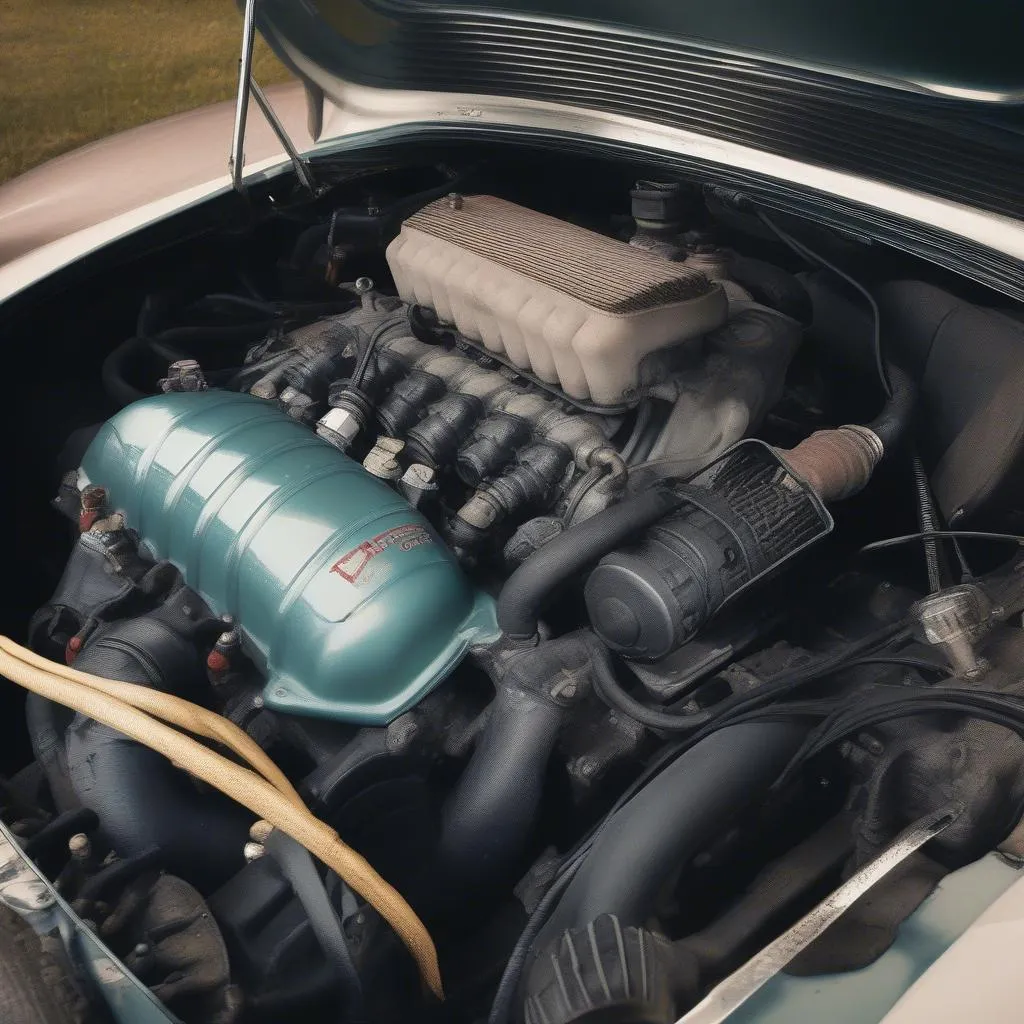“The engine stutters, won’t start? It’s probably the ignition coil again!” Many VW Beetle owners have heard or said this sentence themselves. In fact, the ignition coil in the VW Beetle plays a crucial role in ensuring smooth engine operation. It is, so to speak, the heart of the ignition system, responsible for the vital spark. But how exactly does it work, and how do you recognize a faulty ignition coil?
What is an Ignition Coil and How Does it Work?
Simply put, the ignition coil is a transformer that steps up the battery voltage from 12 volts to a much higher voltage of up to 40,000 volts. This high voltage is necessary to generate a spark in the engine cylinder, which ignites the air-fuel mixture.
Imagine the ignition coil like a water pump: it takes in water at low pressure and increases the pressure to force the water through the hose with full force. The ignition coil works similarly: it “boosts” the voltage to create a strong spark.
VW Beetle engine compartment
VW Beetle engine compartment
Symptoms of a Defective Ignition Coil in the VW Beetle
A defective ignition coil usually manifests itself through various symptoms. These include:
- Engine starts poorly or not at all
- Engine runs unevenly and stutters, especially at idle
- Loss of power, especially at higher RPMs
- Increased fuel consumption
- Misfires
Expert Tip: “Often, a defective ignition coil is only noticed in damp weather or after a rain shower, as moisture can impair the insulation of the ignition coil,” explains Dr. Ing. Helmut Schmidt, automotive expert and author of the book “The VW Beetle – Technology and Practice.”
Causes of a Defective Ignition Coil
The lifespan of an ignition coil is limited. However, external factors can also lead to a defect:
- Aging and wear: Over time, the components of the ignition coil wear out.
- Overheating: Extreme heat in the engine compartment can damage the ignition coil.
- Moisture and corrosion: Moisture can penetrate the ignition coil and cause corrosion.
- Defective spark plug wires or spark plugs: Defective spark plug wires or spark plugs can also overload and damage the ignition coil.
What to Do if You Suspect a Defective Ignition Coil?
If you suspect a defective ignition coil, a check by a specialist should be carried out first. They can measure the ignition coil and test its functionality.
If the ignition coil is defective, it must be replaced. The replacement is usually straightforward and can also be carried out by hobby mechanics themselves.
Replacing an ignition coil
Replacing an ignition coil in a car engine
Preventive Measures
To extend the lifespan of the ignition coil, a few points should be observed:
- Regular inspection of the ignition system: Have the ignition system of your VW Beetle checked regularly by a specialist.
- Use of quality spark plugs and wires: Inferior spark plugs and wires can strain the ignition coil.
- Protection from moisture: Make sure that the ignition coil is dry and clean.
Conclusion
The ignition coil is a small but important component in the VW Beetle. It provides the spark and thus ensures smooth engine operation. If the ignition coil is defective, engine performance suffers, and in the worst case, the car will no longer start.
Do you have further questions about the ignition coil in the VW Beetle or do you need help with troubleshooting? Feel free to contact us – our car experts will be happy to help you! At autorepairaid.com you will also find more helpful tips and tricks for repairing and maintaining your VW Beetle.
More interesting topics about the VW Beetle:
- Adjusting ignition timing VW Beetle
- Adjusting carburetor VW Beetle
- Adjusting valve clearance VW Beetle
Visit us at autorepairaid.com and become experts for your VW Beetle yourself!


